Oportunidades de publicación
Oportunidad de publicación nº 1 - Special Issue in Studies of Applied Economics (seasoned full papers) New Challenges for Economic Policy

Special Issue in Studies of Applied Economics (seasoned full papers)
New Challenges for Economic Policy
IMPORTANTE:
Resolución de 5 de diciembre de 2023, de la Comisión Nacional Evaluadora de la Actividad Investigadora, por la que se publican los criterios para la evaluación de la actividad investigadora:
Campo 8. Ciencias Económicas y Empresariales
Valoración de las aportaciones:
En el caso de los artículos se valorarán preferentemente aquellas aportaciones publicadas en revistas de calidad contrastada o indexadas en bases de datos bibliográficas de reconocido prestigio o en aquellas que hayan recibido un sello o reconocimiento de calidad por un organismo independiente, así como en plataformas de publicación de resultados de investigación como Open Research Europe.
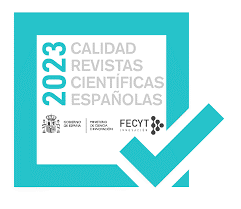
Studies of Applied Economics (Estudios de Economía Aplicada, EEA) has been recognized with the FECYT Quality Seal 2023 by The Spanish Foundation for Science and Technology (FECYT), after having successfully passed the quantitative (impact and visibility) and qualitative (scientific relevance of its publications) evaluation process. The magazine has been indexed in the first quartile with a position 6/35 in Economics.
Professors Carmen-Victoria Escolano and José-María Montero encourage the participants in the XXXVI Annual Congress of the International Association of Applied Economics-ASEPELT to submit original high quality seasoned full papers.
The main key points to note about this special issue are:
- Only papers presented at the ASEPELT 2024 congress can be submitted.
- Articles with a solid theoretical approach or a quantitative approach supported by statistical methods and techniques.
- Submitted articles must be between 15 and 25 pages in length and must follow the editing standards of Studies of Applied Economics (www.revista-eea.net). These guidelines can be consulted in the “submission of originals” tab, where authors are provided with a template (http://www.revista-eea.net/originales.php).
- Use the webpage of the journal for submission (https://ojs.ual.es/ojs/index.php/eea) indicating that the paper is for the Special Issue in New Challenges for Economic Policy.
- Papers go through a fast-tracked review for publication.
- English and Spanish languages are accepted.
Papers on the following topics (but not only) are welcome (These are only some suggestions. The scope of the Special Issue is broad enough in order not to restrict other related contributions):
- Globalization, politics, economy, and society
In a globalized environment, national economic policies see their autonomy restricted, and it is international markets that condition economic policy options, and therefore determine to some extent the model of society. It is not a new issue, but the analysis of the consequences that protectionist policies and conflicts have for the development of trade, growth, and well-being continue to be a hot topic.
- New dimensions of monetary policy
In a globalized environment, central banks can hardly pursue independent policies. Shocks stemming from financial crises, pandemics, and international conflicts lead to similar, though not necessarily synchronized, responses from central banks. On the other hand, monetary policy has undergone a substantial transformation as central banks operate through the purchase of debt assets, in addition to the conventional interest rate instrument. Exploring the relationships between monetary and fiscal policy in the international economy is a relevant area of work.
- Geopolitical blocks and international trading relationships
The new international scenario structured in geopolitical blocs is reconfiguring international economic relationships. Trade tensions between the world's two major powers, the US and China, and trade-restrictive measures are generating uncertainty around international trade. In this more fragmented and less predictable environment, trade relationships between geopolitical blocs —as well as trading within those blocs— the location of supply chains and the location of supply chains, and trade policy strategies are increasingly important topics in the field of applied economics.
- Business internationalization policies
Policies to support the internationalization of enterprises are an effective instrument for promoting economic growth and job creation, and for increasing the competitiveness of enterprises. In the current complex global economic context, these policies must be adapted to the needs and profile of companies, although there may be contradictions between public policies for companies and the strategies of some companies.
- Sustainability and economic policy
At a country scale, the sustainability of economic activity directly depends on the economic policies implemented in each country. Fiscal policies, industrial policies to improve competitiveness as well as financing policies play a key role in driving sustainable initiatives and projects. EU policies involve a compromise between member countries that is difficult to achieve, with reactions to policies that in the short-term harm sectors and countries. What scope is left for national policies to achieve sustainability?
Keywords: monetary policy, internationalization policies, geo-political blocs, trading policy, sustainability.
Important dates:
- Submisions deadline: 31/09/2024
- Expected publication date: December 2024
Invited editors:
Carmen Victoria Escolano Asensi, University Miguel Hernández at Elche, Spain
Jose-María Montero Lorenzo, University of Castilla-La Mancha, Spain
Oportunidad de publicación nº 2 - Revista de Estudios Empresariales. Segunda época

María Gutiérrez Salcedo y Manuela Vega Zamora (Universidad de Jaén) invitamos a los congresistas a enviar sus contribuciones a la Revista de Estudios Empresariales. Segunda Época, para su publicación en el número 2025/01, con deadline el 30 de agosto de 2024.
Nuestra revista, publicada por la Universidad de Jaén, ofrece una plataforma multidisciplinaria de acceso abierto para la investigación en Ciencias Económicas y Empresariales Aplicadas. El objetivo es difundir trabajos de investigación que cumplan las adecuadas exigencias de rigor y calidad científicas, sobre temas relacionados con la empresa y la economía en general.
Aceptamos artículos en español e inglés, fomentando la diversidad lingüística y académica, y para acelerar el proceso de difusión, disponemos de un espacio para artículos en su versión final con las modificaciones incorporadas y aceptados por el Consejo Editorial, previo a su publicación definitiva (Online First).
Además, la Revista de Estudios Empresariales. Segunda Época está indexada en la prestigiosa base de datos Web of Science (WoS) desde 2020, en la categoría Business – ESCI, y cuenta con el sello de calidad de revistas científicas españolas de la FECYT.
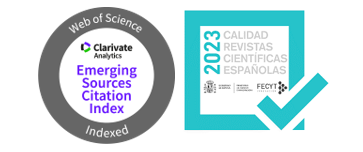
¡Únete a nosotros y contribuye al avance del conocimiento en el campo económico y empresarial!
Oportunidad de publicación nº 3 - Mathematics
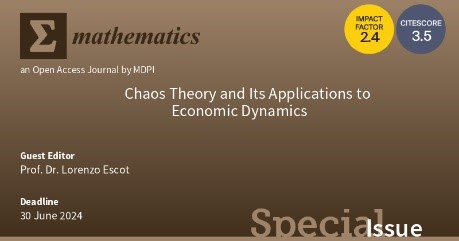
If you are doing research on Chaos Theory and Its Applications to Economic Dynamics Professor Lorenzo Escot (Complutense University of Madrid, Spain) invites you to contribute your paper to the Mathematics Special Issue on this topic.
This Special Issue on Chaos Theory and Its Applications to Economic Dynamics is intended to be a forum for recent developments of nonlinar chaotic systems applied to Economics:
• Theoretical models that, based on a rigorous economic foundation, allow the emergence of chaotic solutions.
• Applications of tools to detect chaotic behavior behind time series.
• Applications of chaos control in economics
• New techniques to improve economic predictions based on chaos theory.
The submission deadline is 30 June 2024, although all submissions before the deadline will be peer-reviewed (approximately 30 days after submission) and the accepted papers will be published immediately.
The Mathematics Editorial Office offers discounts of up to 100% for high-quality papers. For more information, please visit the Special Issue website at
or contact Prof. Lorenzo Escot at escot@ucm.es.
For further details on the submission process, please refer to the instructions for authors at the journal website http://www.mdpi.com/journal/mathematics/instructions
Oportunidad de publicación nº 4 - Revista de Fomento Social

Revista de Fomento Social (uloyola.es)
Vicente González, PhD, director de la Revista de Fomento Social invita a los participantes en el Congreso ASEPELT 2024 a publicar sus trabajos en una Sección Especial dedicada a este Congreso, que está previsto incorporar en el número que se publicará antes de final de julio de 2024.
La Revista de Fomento Social es una revista científica cuatrimestral de acceso abierto que trata temas relacionados con un acercamiento multidisciplinar del desarrollo, abordado desde campos tan diversos como la economía, el derecho, la comunicación, la educación, la sociología, las relaciones internacionales, la salud, la política o la ingeniería, entre otros, con una especial atención a la dimensión ética implícita en todos ellos. Por tanto, nuestra línea editorial es plenamente coincidente con el enfoque del XXXVII Congreso Internacional de Asepelt 2024, dada la relevancia e implicaciones en el campo del desarrollo de los nuevos desafíos de la política económica, desde la perspectiva institucional, de políticas públicas o del análisis de realidades concretas. Por tanto, invitamos a todos los participantes a enviarnos sus trabajos para que puedan incorporarse a una Sección Especial dedicada a este Congreso, que prevemos incorporar en el número que se publicará antes de final de julio de 2024.
Nuestra Revista cuenta con más de 75 años de historia, y es la publicación académica española con más años de edición ininterrumpida. Transformada desde 2019 en una publicación digital, acepta artículos en español, inglés y francés, y está disponible en acceso abierto con el objeto de difundir, promover y contribuir en el intercambio del conocimiento. En este sentido, el envío de artículos no supone ningún coste, ni tampoco editarlos y publicarlos en acceso abierto. Está indexada en REDIB, ERH PLUS, Dialnet o Latindex v2.0, entre otros.

Publication Opportunity nº 5 - Electronic Research Archive (Open Access)
Electronic Research Archive (Open Access)
ISSN 2688-159
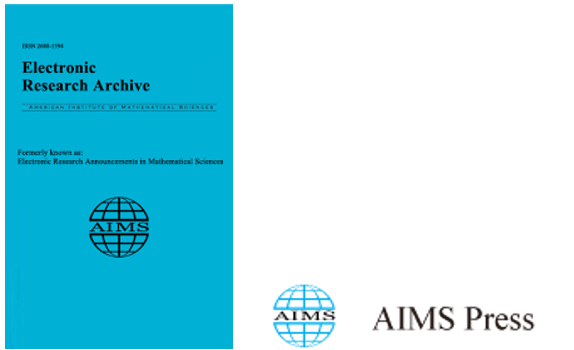
Electronic Research Archive (ERA) is indexed by following databases:
• Academic OneFile (Gale)
• Current Contents/Physics, Chemical, & Earth Sciences
• Essential Science Indicators
• Journal Citation Reports/Science Edition
• Mathematical Reviews/MathSciNet
• PASCAL/CNRS
• Science Citation Index Expanded

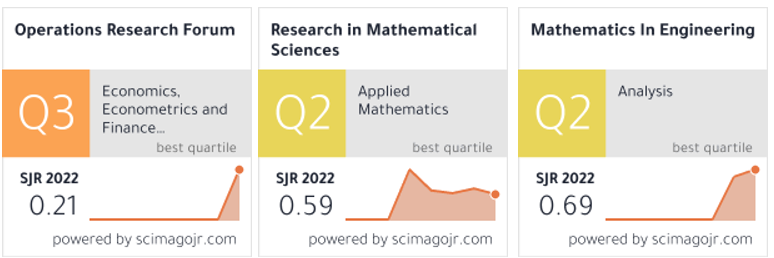
Professors Montero, Valls, Carrasco, and Santos invite the participants in the XXXVII International Congress of the International Association of Applied Economics- ASEPELT to submit their research to the:
Special Issue: Quantitative Methods in Applied Economics
Guest Editors
Prof. José-María Montero
University of Castilla-La Mancha, Spain
Email: Jose.MLorenzo@uclm.es
Prof. María del Carmen Valls Martínez
University of Almería, Spain
Email: mcvalls@ual.es
Prof. Ramón Alberto Carrasco González
Complutense University of Madrid
Email: ramoncar@ucm.es
Prof. José Manuel Santos Jaén
University of Murcia, Spain
Email: jmsj1@um.es
Manuscript Topics
Applied economics is one of the most receptive scientific fields to the new developments on quantitative (and qualitative) methods, as well as to the advances in data science. In recent times, scholars have relied on advances in quantitative research methods that have sought to refine and overcome traditional statistical techniques, pushing forward the discipline to new limits.
This special issue aims to contribute to Applied Economics continuing to be a fertile scientific field where new developments in data science and quantitative methods can be put into practice, as this will result not only in the refinement of such methods but also in advances of great social utility in the socioeconomic field. In addition, given the rapid pace and broad spectrum of contemporary advances in quantitative research methods, this issue pretends to give the scholars the opportunity to explore their important questions from multiple novel angles.
The above-mentioned techniques include ̶ but not limited to ̶ economic modelling, time series analysis, supervised and unsupervised machine learning, deep learning, text mining, graph networking, spatial and spatial-temporal statistics, statistical software, among others. Articles on ethics on analysis of data, data governance, feature engineering, and management of SQL and NoSQL economic databases are also very welcome.
In brief, this special issue is an attempt to bring some applications of recent quantitative methodological developments to the readers of ERA interested in economic problems and challenges, or in the developments themselves. It will allow them to understand much better how the methodological innovations are shaping and redefining the business and economic sphere.
The special issue webpage has been set up at:
http://www.aimspress.com/era/article/6704/special-articles
Instructions for authors
http://www.aimspress.com/era/news/solo-detail/instructionsforauthors
Please submit your manuscript to online submission system
Paper Submission
All manuscripts will be peer-reviewed before their acceptance for publication. The deadline for manuscript submission is 30 November 2024.
Publication Opportunity nº 6 - Book on Teaching Innovations in Economics. Towards a Sustainable World (book chapters) - Springer (Nº 1 in the Scholarly Publishers Indicators ranking)
Solo para participantes en la First Conference on Teaching Innovations in Economics- ASEPELT
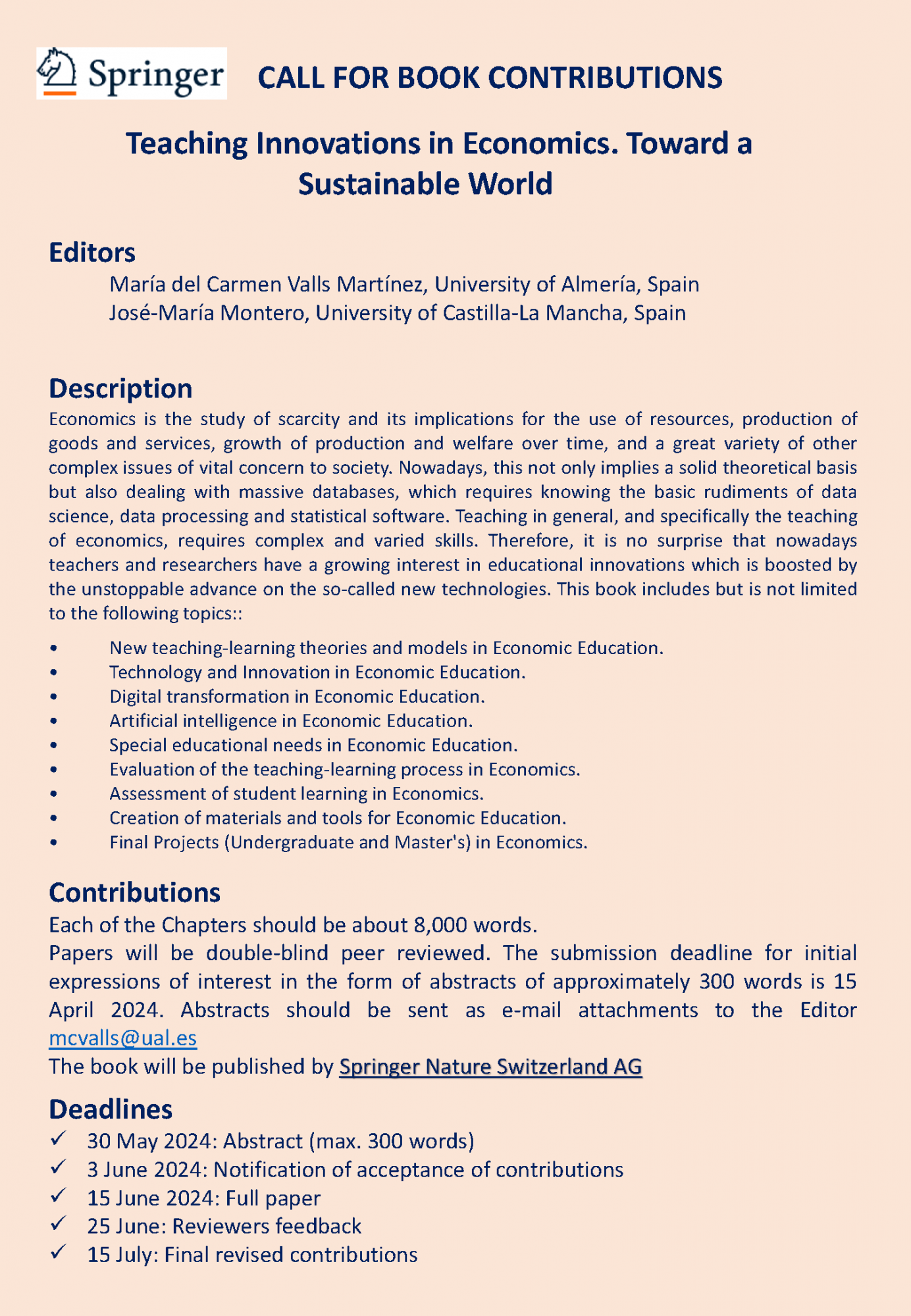
Publication Opportunity nº 7 - Mathematics - Financial Mathematics and Sustainability
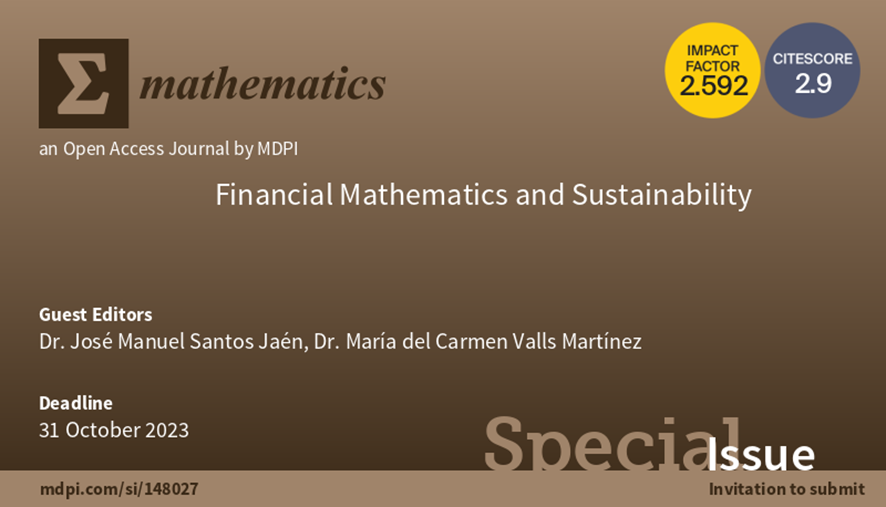
Link to Special Issue:
https://www.mdpi.com/si/mathematics/Fin_Math_Sustain
Financial mathematics focuses on applying mathematical formulas and equations to financial problems, market modeling, and data analysis. With this approach, finance professionals can better understand the performance of companies, including profitability and growth potential. These aspects are crucial to ensuring the economic sustainability of companies. That is the ability of organizations to manage the resources they have and responsibly generate profitability over the long term.
On the other hand, investors and savers are increasingly aware of sustainability issues. They want to know what activities are financed with their savings and, in many cases, invest in instruments that achieve specific social or environmental objectives. Sustainable and responsible investment (SRI) is an investment philosophy that integrates environmental, social, and governance (ESG) criteria.
Under these two premises, financial mathematics has become an indispensable ally in achieving the UN's Sustainable Development Goals (SDGs), contributing to eradicating poverty, protecting the planet, and ensuring prosperity for all.
Therefore, this Special Issue focuses on applying financial mathematics to sustainability, providing a platform for researchers to present their novel and unpublished papers with stunning results.
The Mathematics Editorial Office offers discounts of up to 100% for high-quality papers. You can contact Professors: jmsj1@um.es – mcvalls@ual.es
For further details on the submission process, please refer to the instructions for authors at the journal website http://www.mdpi.com/journal/mathematics/instructions
Deadline for manuscript submissions: 31 October 2024
Publication Opportunity nº 8 - Frontiers in Public Health
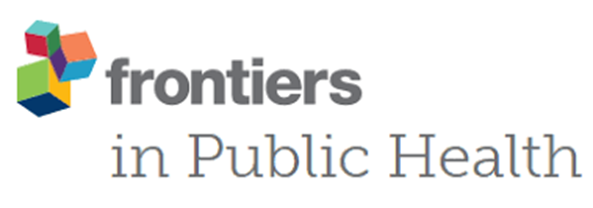
Journal Impact Factor: 5.2
Link to Special Issue:
World Health Day 2024 presents an opportunity to delve into the theme "My Health, My Right," as designated by the World Health Organization (WHO). This Research Topic aims to explore and analyze various aspects of health equity, individual rights, and their intersection within the broader context of global health.
Key areas of interest include but are not limited to:
• Health Equity: Investigating disparities in access to healthcare services, resources, and outcomes among different populations and regions
• Human Rights and Health: Exploring the relationship between human rights frameworks and the realization of health rights, including issues such as healthcare access, informed consent, privacy, and discrimination
• Social Determinants of Health: Examining how social, economic, and environmental factors influence health outcomes and contribute to health inequalities
• Health Policy and Governance: Assessing the effectiveness of policies, strategies, and governance structures in promoting health equity and upholding the rights of individuals to health
• Community Empowerment and Participation: Exploring initiatives that empower communities to advocate for their health rights, participate in decision-making processes, and contribute to improving health outcomes
• Health Education and Literacy: Evaluating the role of health education, literacy, and empowerment in promoting individual agency, informed decision-making, and the realization of health rights
• Innovative Approaches and Interventions: Highlighting innovative approaches, interventions, and best practices aimed at addressing health disparities, promoting health equity, and safeguarding health rights
• Ethical Considerations: Addressing ethical dilemmas and considerations related to health equity, individual rights, and the provision of healthcare services, particularly in diverse cultural and socio-economic contexts.
This Research Topic welcomes original research articles, reviews, perspectives, and commentaries that contribute to advancing understanding, knowledge, and solutions related to promoting health equity and individual rights on World Health Day 2024. Contributions from diverse disciplines, including public health, medicine, social sciences, ethics, law, and policy, are encouraged to provide comprehensive insights into this important global health issue.
Guest Editors
María del Carmen Valls Martínez, University of Almería (Spain)
Barbara Sawicka, University of Life Sciences of Lublin (Poland)
Hubert Amu, University of Health and Allied Sciences (Ghana)
Tsitsi Masvawure, Worcester Polytechnic Institute (United States)
Olatunde Aremu, Birmingham City University (United Kingdom)
Mo Salman, Animal Popultion Health Institute (United States)
Martin Amogre Ayanore, University of Health and Allied Sciences (Ghana)
Manuscript Submission Deadline 20 October 2024
Publication Opportunity nº 9 - Topics MDPI: Advanced Techniques and Modeling in Business and Economics
Topics MDPI: Advanced Techniques and Modeling in Business and Economics
Link:
https://www.mdpi.com/topics/ATMBE
Participating Journals
| AI | |
| Data | https://www.mdpi.com/journal/data |
| Economies | https://www.mdpi.com/journal/economies |
| Mathematics | https://www.mdpi.com/journal/mathematics |
| Risks | https://www.mdpi.com/journal/risks |
The integration of advanced techniques, including artificial intelligence (AI), computational economics and big data analytics, into the economy and business sectors has become increasingly significant. These technologies possess capabilities to process vast amounts of data, recognize intricate patterns, and provide precise predictions, thereby revolutionizing our approach to economic and business issues. This shift has transformed our understanding and methods of addressing challenges within these landscapes.
Businesses leverage these advanced techniques to optimize their processes, streamline operations, and achieve higher levels of productivity and cost-effectiveness. Similarly, policymakers are recognizing the potential of these tools in formulating more informed and targeted economic policies. By harnessing the analytical power of such advanced techniques, governments and organizations can make data-driven decisions that lead to better outcomes and increased competitiveness in the global market.
This Topic endeavors to delve into the multifaceted application of advanced techniques in business and economics. We welcome contributions that explore the innovative use of AI, blockchain, big data analytics, computational economics, trend forecasting, and other emerging technologies. We encourage a broad range of topics, including but not limited to economic trend forecasting, optimization of business processes, meticulous analysis of financial risks, intricate modeling of consumer behaviors, formulation of impactful policies, innovative applications within the realms of finance and banking, scrutiny of its effects on the labor market dynamics, as well as its potential contributions to fostering Corporate Social Responsibility (CSR) practices.
We invite scholars and researchers to submit their original research, empirical studies, theoretical frameworks, and case studies that illuminate the myriad dimensions of integrating advanced techniques into the economic and business landscapes.
Dr. José Manuel Santos Jaén
Dr. Ana León-Gómez
Dr. María del Carmen Valls Martínez
Topic Editors
The Editorial Office offers discounts of up to 100% for high-quality papers. You can contact Professors: jmsj1@um.es – ana.leon@uma.es – mcvalls@ual.es
Deadline for manuscript submissions: 30 September 2025



















